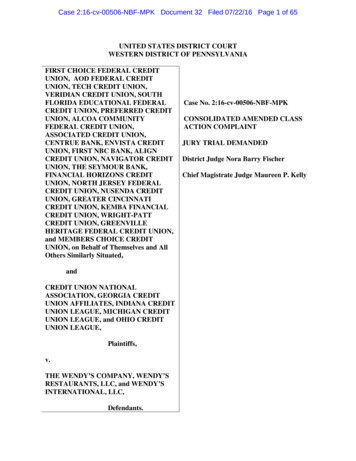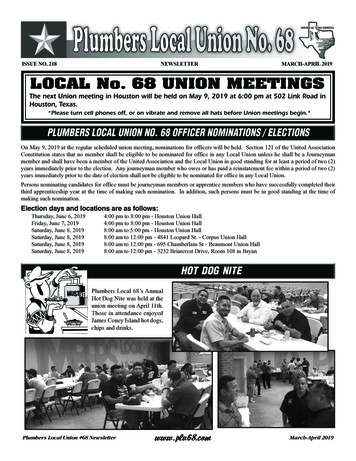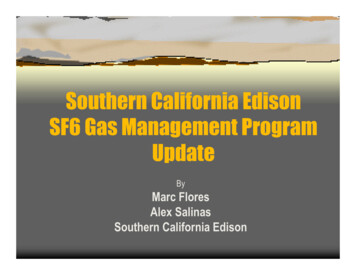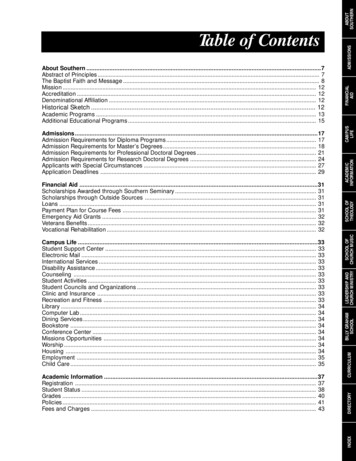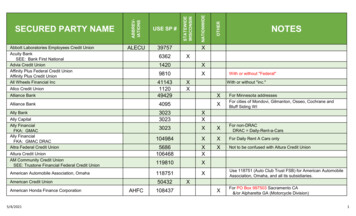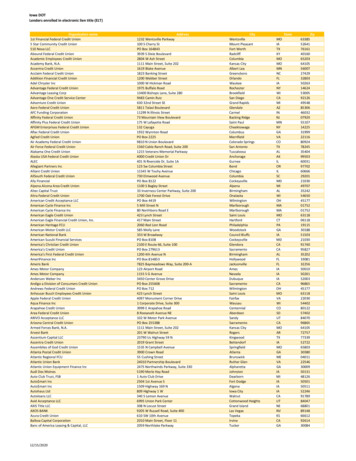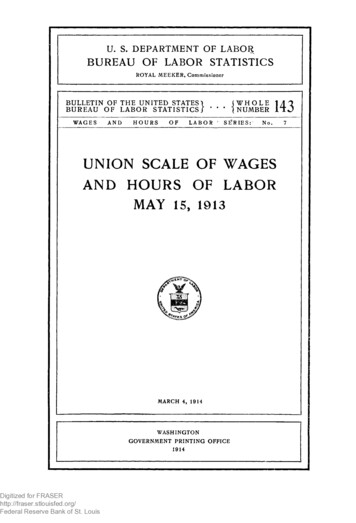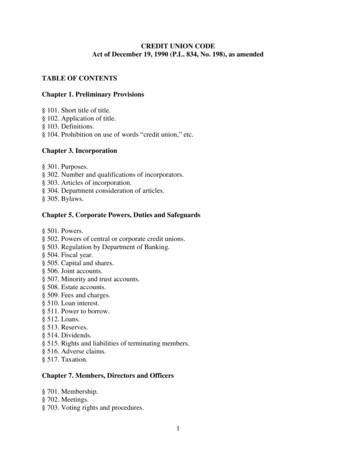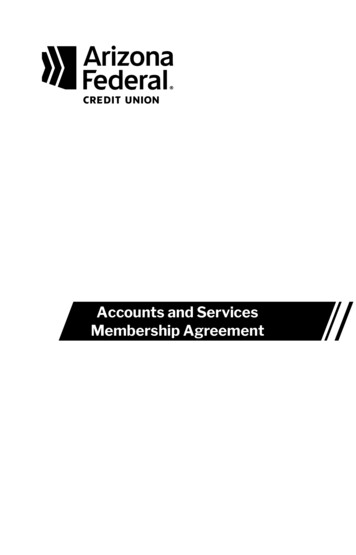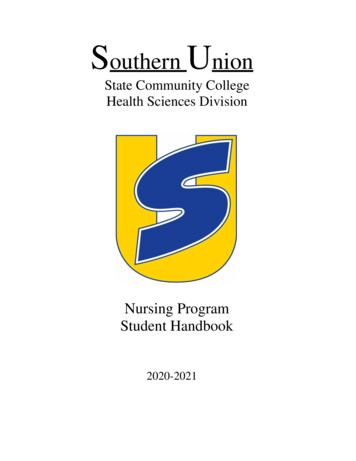
Transcription
Southern UnionState Community CollegeHealth Sciences DivisionNursing ProgramStudent Handbook2020-2021
TABLE OF CONTENTSPROGRAM INFORMATIONACCS STANDARDIZED NURSING CURRICULUMADN DEGREE/PN CERTIFICATE REQUIREMENTSAPPROVED HUMANITIES ELECTIVESCONCEPTUAL FRAMEWORKEND OF PROGRAM STUDENT LEARNING OUTCOMES / GRADUATE COMPETENCIESMOBILITY OPTION (LPN TO ADN)MOBILITY OPTION (PARAMEDIC TO ADN)NURSING PROGRAM MISSION & PHILOSOPHYSTATE APPROVAL & NATIONAL ACCREDITATION STATUSSUSCC NURSING PROGRAM OUTCOMES10914871113659GENERAL INFORMATIONACADEMIC HONESTY CODE/ACADEMIC INTEGRITY/STUDENT BEHAVIORADMINISTRATIVE WITHDRAWAL/DROPCELL PHONESCHANGES TO PROGRAM - INFORMING STUDENTSCOLLEGE ACTIVITIESCOMMUNICATION CHANNELS/CHAIN OF COMMANDCOMPUTER COMPETENCECOMPUTER LABS AND INTERNETCOMPUTERIZED TESTINGCOURSE MANAGEMENT SYSTEM - WEB BASED MATERIALSELECTRONIC DEVICE USEFUNDRAISINGHARASSMENT POLICYHONESTY AND PLAGARISMNURSING PROGRAM REGISTRATION REQUIREMENTSNURSING STUDENT REPRESENTATIVESPARTICIPATION IN PROGRAM OF LEARNINGRANDOM DRUG TESTINGRESPONSIBILITY IN TEACHING AND LEARNINGSMOKE FREE-TOBACCO FREE POLICYSOCIAL NETWORKING POLICYVIDEO RECORDING/PHOTOGRAPHYVISITOR 16CLASSROOMACCESS TO INSTRUCTORS / TUTORINGAPPEAL POLICY/FORMAL DUE PROCESS PROCEDUREATTENDANCE POLICY (CLASSROOM)CLASSROOM INTERACTIONCOURSE EVALUATION / GRADESCOURSE SYLLABIHESI EXAM SCORINGMAKE-UP TESTS22828292626262728
TESTING POLICYTEST REVIEW2728CLINICAL / LAB / SIMULATIONCLINICAL ABSENCES / TARDINESSCLINICAL ASSIGNMENTS (WRITTEN/DIGITAL)CLINICAL EVALUATIONCLINICAL FAILURECLINICAL SKILLS LABORATOY POLICYCONFIDENTIALITY/ HIPAAELIGILIBITY FOR CLINICAL ROTATIONSHIPAA- HEALTH INSURANCE PORTABILITY AND ACCOUNTABILITY ACT OF 1996INJURY DURING CLINICALLEGAL RESPONSIBILITIES IN THE CLINICAL SETTINGSIMULATION CENTER OVERVIEWUNIFORM GUIDELINESUNIVERSAL PRECAUTIONS35343536373831383431403334STUDENT HEALTH INFORMATION / CLINICAL REQUIREMENTSCPR CERTIFICATIONESSENTIAL FUNCTIONSESSENTIAL FUNCTIONS VERIFICATIONHEALTH INSURANCEHEALTH POLICYMALPRACTICE INSURANCERELEASE OF CLINICAL INFORMATIONSTUDENT HEALTH RECORDS / DOCUMENTSSUBSTANCE ABUSE POLICY434344434243434345NURSING PROGRESSION POLICIESDEFINITIONS (REINSTATEMENT / READMISSION)PROCESS FOR REINSTATEMENTPROGRESSION POLICYREADMISSION / REINSTATEMENT POLICYTRANSFER POLICY4748474748LICENSUREAPPLICATION FOR LICENSUREDENIAL OF A LICENSELEGAL LIMITATIONS FOR LICENSURE AND EMPLOYMENTTHE CONTENT IN THIS HANDBOOK SUPERSEDES THE COLLEGE CATALOG AND STUDENTHANDBOOK.3494949
INTRODUCTIONWelcome to the Nursing Program at Southern Union! You join a very select group of students whohave attended Southern Union's nursing program since 1977. A distinguished group of men and womenhave graduated from the Nursing Programs at Southern Union, passed the licensure examination, andentered the employment setting with clinical skills second to none. Southern Union has an excellentreputation, primarily because of the graduates' performance and attitude following graduation. Thegraduates who preceded you significantly shaped this nursing program by offering valuableobservations, opinions, suggestions, criticisms, and insight from a student's perspective. Your input as astudent, and later as a graduate, is equally important to this nursing program, college, and community.Southern Union values every student who attends the College and respects every student's rights andprivileges. This Student Handbook has been prepared to allow you to carefully review the opportunities,rights, responsibilities, and policies that apply to you as a nursing student. Unless otherwise designatedin a nursing course syllabus, these policies apply to each nursing course in which you enroll. If, for anyreason, routine progression through the program is interrupted, policies in the Student Handbook andCollege Catalog at the time of readmission/reinstatement will apply. After you have read thishandbook, you be asked to provide a digital signature indicating that you have read and understand thepolicies outlined in this handbook.Each person at the College is committed to your success – as a student, a professional, and mostimportantly, as an individual. If you need additional assistance, our doors are always open to you. Again,welcome to Southern Union.Rhonda Davis MSN, RNDean of Health SciencesLisa Shiver DNP, RNNursing Department Chair4
PROGRAM INFORMATIONSTATE APPROVAL & NATIONAL ACCREDITATION STATUSSouthern Union State Community College’s Associate Degree Nursing program is fully approved bythe Alabama State Board of Nursing and accredited by the Accreditation Commission for Education inNursing (ACEN). The last self-study and on-site visit from the Alabama Board of Nursing was in Fall2019 and from the Accreditation Commission for Education in Nursing in Fall 2014.Southern Union State Community College’s Practical Nursing program is fully approved by theAlabama State Board of Nursing and is a candidate for accreditation by the Accreditation Commissionfor Education in Nursing (ACEN). The last self-study and on-site visit from the Alabama Board ofNursing was in Fall 2019.Comments or complaints can be directed to:Alabama Board of NursingRSA Plaza, Suite 250770 Washington AvenueMontgomery, AL 36130-3900(334) 242-4060Accreditation Commission for Education in Nursing (ACEN)3343 Peachtree Road NE, Suite 850Atlanta, Georgia 30326404-975-5000www.acenursing.com5
NURSING PROGRAM MISSION & PHILOSOPHYMISSIONOur mission is to prepare students to practice safe, competent, patient-centered care in an increasinglycomplex and rapidly changing health care system. We seek to provide full and equal access toopportunities for educational success to meet the community needs.PHILOSOPHYWe believe that nursing is a dynamic profession, blending science with the use of evidence-basedpractice and clinical reasoning and the art of caring and compassion to provide quality, patient-centeredcare.We believe learning is an interactive process in which faculty and students share responsibility to meetprogram outcomes. We believe in using educational methods that are current and supportive of studentsin the teaching and learning environment. Learning is enhanced by the presentation of information fromsimple to complex.Nursing is guided by standards of practice and standards of professional performance. Standards reflectthe values and priorities of the nursing profession. Therefore, we have integrated standards from theQuality and Safety Education for Nurses (QSEN) and National League of Nursing (NLN) into ourphilosophy as part of our core values.6
Practical Nursing End-of-Program StudentLearning Outcomes/GraduateCompetencies (Semester 3)Human Flourishing(Semester 3)Promote the human dignity, integrity, self-determination, andpersonal growth of diverse patients, their families, and oneselfto provide individualized, culturally appropriate, relationshipcentered nursing care (NLN, 2014).Patient-Centered CareAdvocate for the patient and family in the provision ofcompassionate and coordinated care to support the health,safety, and well-being of patients and families (QSEN, 2012).Nursing JudgementMake judgments in practice, substantiated with evidence, thatintegrate nursing science in the provision of safe, quality carefor diverse patients and their families in collaboration with thehealth care team (NLN, 2014).InformaticsIncorporate information and technology within own scope ofpractice to support safe processes of care (QSEN, 2012).SafetyDemonstrate the effective use of strategies to reduce risk ofharm to self or others (QSEN, 2012).Professional identityArticulate a unique role as a member of the healthcare team,committed to evidence-based practice, caring, advocacy, andsafe quality care, to provide optimal health care for diversepatients and their families (NLN, 2014).Teamwork and CollaborationFunction competently within own scope of practice as amember of the health care team (QSEN, 2012).Spirit of InquiryCollaborate with healthcare team members, utilize evidence,tradition, and patient preferences in predictable patient caresituations to promote optimal health status (NLN, 2014).Quality ImprovementUtilize various sources of information to review outcomes ofcare identifying potential areas for improvement of the qualityand safety of care (QSEN, 2012).Evidence-Based PracticeImplement evidence-based practice in the provision ofindividualized health care (QSEN, 2012)7Associate Degree Nursing End-of-Program StudentLearning Outcomes/Graduate Competencies(Semester 5)Human FlourishingAdvocate for patients and families in ways that promote theirself-determination, integrity, and ongoing growth as humanbeings (NLN, 2010).Patient-Centered CareRecognize the patient or designee as the source of control and fullpartner in providing compassionate and coordinated care based onrespect for patient’s preferences, values, and needs (QSEN, 2012).Nursing JudgementMake judgments in practice, substantiated with evidence, thatintegrate nursing science in the provision of safe, quality care andpromote the health of patients within a family and communitycontext (NLN, 2010).InformaticsUse information and technology to communicate, manageknowledge, mitigate error, and support decision making (QSEN,2012).SafetyMinimize risk of harm to patients and providers through bothsystem effectiveness and individual performance (QSEN, 2012).Professional IdentityImplement one’s role as a nurse in ways that reflect integrity,responsibility, ethical practices, and an evolving identity as anurse committed to evidence-based practice, caring, advocacy,and safe, quality care for diverse patients within a family andcommunity context (NLN, 2010).Teamwork and CollaborationFunction effectively within nursing and inter-professional teams,fostering open communication, mutual respect, and shared decisionmaking to achieve quality patient care (QSEN, 2012).Spirit of InquiryExamine the evidence that underlies clinical nursing practice tochallenge the status quo, question underlying assumptions, andoffer new insights to improve the quality of care for patients,families, and communities (NLN, 2010).Quality ImprovementUse data to monitor the outcomes of care processes and useimprovement methods to design and test changes to continuouslyimprove the quality and safety of health care systems (QSEN,2012).Evidence-Based PracticeIntegrate best evidence-based practice with clinicalexpertise, patient/family preferences, and values fordelivery of optimal health care (QSEN, 2012).
CONCEPTUAL FRAMEWORKThe conceptual framework derived from the philosophy forms a basis for the organization andstructure of the nursing curriculum. This framework serves as a guide for nursing instruction in theattainment of student learning outcomes.The framework consists of concepts that encompass the qualities of a successful graduate nurse. NLNcompetencies were chosen because they specifically define the competencies of the graduate AssociateDegree Nurse. QSEN competencies reflect current contemporary practice. Concepts interlace NLN andQSEN competencies to achieve the goal of providing graduate nurses with the tools needed to provideholistic care in an ever-changing health care delivery system. Each competency includes knowledge,skills, and attitudes to serve as a basis for consistent performance expectations across academic andpractice settings.8
SUSCC NURSING PROGRAM OUTCOMES1. Performance on Licensure ExamThe annual licensure exam pass rate will be at least 80% for all first-time test-takersduring the same 12-month period.2. Program Completion70% of the students admitted will graduate within 150% of the time of the stated programlength beginning with the first required nursing course.3. Job Placement90% of the graduates seeking employment will be employed one year after graduationin a position for which the program prepared them.4. Program Satisfaction90% of graduates responding to the graduate survey distributed within one yearafter graduation will indicate satisfaction with the program.5. Continuing Education in Field60% of responding graduates will indicate they are continuing their education inthe healthcare field.ADN DEGREE/PN CERTIFICATE REQUIREMENTS1. Earn a minimum of 25% of all credits applied to the degree at Southern Union.2. Complete at least 18 semester hours in discipline-specific courses required in the program of studyat Southern Union.3. Successfully complete a program of assessment.4. Earn total credit hours (including transfer and native) equal to the minimum number of credit hoursrequired in the program at the time the degree/certificate is granted.5. Complete all requirements for graduation at Southern Union within one calendar year from thelast term of attendance.6. Comply with all formal procedures for graduation in accordance with College policy. See CollegeCatalog.9
Weekly LabContact HoursClinical CreditHoursWeekly ClinicalContact HoursTotal CreditHoursWeekly TotalContact HoursProgram Total 44Lab CreditHoursFirst Semester*NUR 112 – Fundamentals Concepts of Nursing4Course TermMTH 100 (or Higher)3BIO 201 – A & P I3Total 10Second SemesterNUR 113 – Nursing Concepts4ENG 101 – English3PSY 210 – Human Growth and Development3BIO 202 A & P II3Total 13Third Semester**NUR 114 – Nursing Concepts II 5 NUR 115 – Evidence Based Clinical Reasoning1SPH 106 or 107 – Speech3Total 9Fourth SemesterNUR 211 – Advanced Nursing Concepts4BIO 220 – General Microbiology2Total 6Fifth Semester***NUR 221 – Advanced Evidence Based Clinical3ReasoningHUM (Ethics preferred)3Total 6Weekly TheoryContact HoursTheory CreditHoursALABAMA COMMUNITY COLLEGE SYSTEMSTANDARDIZED NURSING 000401231031844717154566106A course grade of “C” or higher is required for all nursing and academic core courses.*Upon successful completion of NUR 112, students are eligible to apply to take the Nursing AssistantCertification Examination (NACEP) to become a Certified Nursing Assistant (CNA).**Upon successful completion of all third semester coursework in the nursing curriculum, students areeligible to apply to take the National Council Licensure Examination for Practical Nurses (NCLEXPN).10
***Upon successful completion of all fifth semester coursework in the nursing curriculum, students areeligible to apply to take the National Council Licensure Examination for Registered Nurses (NCLEXRN). NUR 114 must be taken prior to, or concurrently with NUR 115.NURSING PROGRAM CONTACT HOURSAcademic and Nursing Theory Contact HoursAcademic and Nursing Lab contact HoursNursing Clinical Contact HoursTotal Program Contact HoursPN Curriculum4801953601035ADN Curriculum6602556751590MOBILITY OPTION (LPN TO ADN)In addition to the general admission requirements for the College and the nursing program, admission tothe Associate Degree Nursing Mobility program for LPN requires:a.b.c.d.Applicant meets all nursing program general admission requirementsAn unencumbered or non-restricted license as a Practical Nurse in Alabama.Submission of application for the LPN to RN Mobility option.Completion of prerequisite general education courses with a minimum grade of “C”. Courses are:Prerequisite Courses: MTH 100 (or Higher-Level Math) (3 credit hours) BIO 201 Human Anatomy and Physiology I (4 credit hours) BIO 202 Human Anatomy and Physiology II (4 credit hours) ENG 101 English Composition (3 credit hours) PSY 210 Human Growth and Development (3 credit hours) SPH 106 or 107 – Speech (3 credit hours)Total Prerequisites 20 credit hours11
CourseNUR 209- Concepts for HealthcareTransition Students*First Semester TotalCourseBIO 220- General MicrobiologyNUR 211- Advanced Nursing ConceptsSecond Semester TotalCourseNUR 221- Advanced Evidence BasedClinical ReasoningHUM (Ethics preferred)Third Semester TotalFirst Second t61319Third 18639100A course grade of “C” or higher is required for all nursing and academic core courses.*Students who have successfully completed NUR 209 will be awarded 15 additional non-traditionalhours at completion of the Mobility Program.Track II LPN to ADN Mobility Option- eligible students may apply to be admitted to the Track IILPN to ADN Mobility Option. Licensed Practical Nurses must apply for admission within two years ofgraduation from an Alabama Community College practical nursing program offering the currentstandardized curriculum (NUR 112, 113, 114, and 115). Admission into the Track II LPN to ADNMobility option is based on clinical space and is not guaranteed. Meeting minimum admissionrequirements does not guarantee acceptance to the program. Once admitted, students enter the programinto NUR 211.12
MOBILITY OPTION (PARAMEDIC TO ADN)In addition to the general admission requirements for the College and the nursing program, admission tothe Associate Degree Nursing Mobility program for paramedics requires:a.b.c.d.e.Applicant meets all nursing program general admission requirementsAn unencumbered or non-restricted license as a Paramedic in Alabama.Current Certified Nursing Assistant (CNA) certification in Alabama.Submission of application for the Paramedic to RN Mobility option.Completion of prerequisite general education courses with a minimum grade of “C”. Courses are: BIO 201 Human Anatomy and Physiology I (4 credit hours)BIO 202 Human Anatomy and Physiology II (4 credit hours)ENG 101 English Composition (3 credit hours)SPH 107 Fundamentals of Public Speaking (or SPH 106)MTH 100 Intermediate College Algebra or higher levelPSY 210 Human Growth and Development (3 credit hours)Total Prerequisites 20 credit hoursCourseNUR 209- Concepts for HealthcareTransition Students*First Semester TotalFirst SemesterTheoryLab616Second SemesterCourseTheoryBIO 220- General Microbiology2NUR 211- Advanced Nursing Concepts4Second Semester Total6CourseNUR 221- Advanced EvidenceBased Clinical ReasoningHUM (Ethics preferred)Third Semester TotalThird al4Credit7Contact1503312318A course grade of “C” or higher is required for all nursing and academic core courses.13
*Students who have successfully completed NUR 209 will be awarded 15 additional nontraditional hours at completion of the Mobility Program.APPROVED HUMANITIES ELECTIVESIn addition to Literature, disciplines include but are not limited to: Area/Ethnic Studies, Art and ArtHistory, Foreign Languages, Music and Music History, Philosophy, Ethics, Religious Studies, Theater,and Dance. Southern Union offers the following classes that are transferable to four-year institutions.ARTENGHUMTHR14100272101120Art AppreciationWorld Literature IIIntro to HumanitiesTheatre Appreciation *ENG 271 World Literature IMUS 101 Music AppreciationIDS 102 EthicsForeign Language
GENERAL INFORMATIONCOLLEGE ACTIVITIESStudents have the opportunity to participate in College wide activities which serve to broaden the totalacademic experience. Activities vary from campus to campus and appeal to a variety of interests.Activities are described in the College Catalog, coordinated through the Student Services Office on theWadley Campus, and posted on bulletin boards and/or announced in class.College sponsored clubs and organizations provide opportunities to share similar interests and worktoward common goals. Please see the College Catalog for list of approved organizations. You areencouraged to participate. Nursing students particularly may be interested in belonging to the StudentNurses' Association. A nursing faculty member serves as an advisor for this organization whichparticipates at the local, state, and national level. The faculty members encourage students to becomeactive in professional organizations, and this is a great way to start!NURSING STUDENT REPRESENTATIVESStudent representatives have the primary role of liaising with faculty, staff, and students as a way ofenhancing communication and student involvement in decision-making processes. Studentrepresentatives will be invited to participate in the decision-making processes during nursing facultymeetings and other meetings surrounding special topics. Student representatives may be responsible forcoordinating special events for individual nursing courses and participating in the Health Science AwardsCeremonies. Two (2) student representatives will be nominated by their classmates to represent eachclass. If a student representative does not progress in the nursing program with their class, a newrepresentative will be appointed by the nursing faculty.FUNDRAISINGThe Dean of Health Sciences and Dean of Students must approve all fundraising activities in advance.Fundraising is allowed only by organizations/clubs which are officially recognized by the College. Thesenior officer of the organization should gain approval from the Program Director/Chair and then submita written request (forms are available from the Health Sciences Division) to the Dean of Health Sciences.Upon approval by the Dean of Health Sciences, the request will be forwarded to the Dean of Students.Following approval from the Dean of Students, fundraising activities may proceed.SMOKE-FREE AND TOBACCO-FREE POLICYBecause Southern Union State Community College is committed to providing a safe and healthy workingand learning environment for the students, faculty, and staff on its campuses, it is a smoke and tobaccofree environment.15
The use of all forms of tobacco products on property owned, leased, rented, in the possession of, or inany way used by Southern Union is expressly prohibited. "Tobacco Products" is defined as cigarettes,cigars, pipes, all forms of smokeless tobacco, clove cigarettes and any other smoking devices that usetobacco such as hookahs or simulate the use of tobacco such as electronic cigarettes.Further, this policy prohibits any advertising, sale, or free sampling of tobacco products on SouthernUnion properties. This prohibition includes but is not limited to all areas indoors and outdoors,buildings and parking lots owned, leased, rented or otherwise used by Southern Union. The use oftobacco products is prohibited in all vehicles – private or public vehicles - located on Southern Unionproperties.This policy applies to all persons who enter the areas described above, including but not limited tostudents, faculty, staff, contractors and subcontractors, spectators, and visitors. All events hosted by aSouthern Union shall be smoke and tobacco-free.VISITOR POLICYSouthern Union State Community College welcomes visitors. Visitors are expected to abide by theregulations of the college. Students are held responsible for the conduct of their guests. Children must beunder the supervision of their parents and are not to attend classes. Visitors parking permits are availablefrom campus police on Wadley and Opelika campuses and administrative office on the Valley campus.HARASSMENT POLICYSouthern Union State Community College is committed to protecting its students, staff, and visitorsfrom harassment, intimidation, and exploitation as prohibited by Title IX of the Education Amendmentsof 1972 and of Title VII (Section 703) of the Civil Rights Act of 1964.Harassment includes, but is not necessarily limited to, slurs, jokes, or other verbal, graphic, or physicalconduct relating to an individual’s race, color, gender, religion, national origin, age, or disability.Harassment also includes unwelcome sexual advances, requests for sexual favors, and other verbal,graphic, or physical conduct of a sexual nature.Sexual harassment refers to behavior of a sexual nature which interferes with the work or education ofits victims and their co-workers or fellow students. Sexual harassment may involve the behavior of aperson of either sex against a person of the opposite sex, when submission to such conduct is made either explicitly or implicitly a term or condition ofan individual’s employment or educational opportunities;submission to or rejection of such conduct is used as the basis for employment oracademic decisions affecting that individual;such conduct has the purpose or effect of unreasonably interfering with an individual’swork or academic performance, or creates an intimidating, hostile, or offensive work oreducational environment.Harassment of employees or students by employer, other employees, other students, or non- employeesis a violation of this policy. Any person who believes herself or himself to be subjected to such16
harassment, intimidation, and/or exploitation should first tell the person responsible to stop the action. Inaddition, the person should contact a college official (faculty member or staff member) as promptly aspossible after the harassment occurs. The college official will take appropriate action to resolve thecomplaint which may include a referral to Gary Branch, the Coordinator of Title IX and CollegeGrievance Officer. The telephone number is (334) 745-6437.RESPONSIBILITY IN TEACHING AND LEARNINGThe main purpose of instruction is to promote student learning. This means that teachers direct allmatters dealing with courses. That does not mean that teachers bear sole responsibility for students'education. Students need to follow a teachers’ guidance, study, do homework, and prepare for class tomaster the information and skills being taught. Students cannot expect a good grade in a course withoutputting in several hours of studying for each hour of scheduled class time. The recommended amount ofstudent time is 2 hours per day for each hour of class.Extra-curricular activities, including jobs, will not affect teachers' expectations and should not interferewith students' preparation for classes. Teachers should use their expertise and experience to prepare andpresent the subject of a course in the best possible way.Teachers (that is, anyone who teaches) will do their best to provide a disciplined yet comfortable andsupportive classroom environment. They will encourage questions and questioning, although studentsshould remember that insight often comes from struggling with a problem rather than being given theanswer.The ultimate responsibility for learning lies with the student. Although faculty members will teach,guide, assist, and encourage, learning is the responsibility of the student. Learning is hard work, andfull-time students should consider “studenting” to be a full-time job. A college’s priority is theirstudents. While students pay tuition to attend school, the tuition provides the student access to theexpertise of the faculty members. Students are responsible for evaluating their instructors honestly andcandidly to contribute to each teacher's effectiveness and professional growth.PARTICIPATION IN PROGRAM OF LEARNINGStudents have the opportunity to participate in the development, conduct, and evaluation of the program.The students may contribute through semester evaluation of the course work and instructors, throughparticipation in faculty meetings, and through evaluation of the program and curriculum aftercompletion of the program.The semester evaluations are distributed at the end of the semester to all college students and solicitsanonymous comments regarding course content, instructors, instructional tools, assigned coursework,and examinations. Students are asked to evaluate the entire curriculum at the completion of the programand six months to one year after graduation.17
COMMUNICATION CHANNELS / CHAIN OF COMMANDShould a problem arise during the semester, you should first strive to solve it with the instructor or studentinvolved. If no agreement is reached or dissatisfaction results, you should consult the course coordinator.If this does not solve the issue you may make an appointment with the Program Director/Chair. The Deanof Health Sciences is then consulted if the problem remains unresolved.CHANGES TO PROGRAM - INFORMING STUDENTSPolicies and procedures are communicated to students by means of the Health Sciences or programspecific handbook, course learning management system, the College Catalog, and institutional website.This handbook is revised regularly to provide current and accurate information is provided the location ofthe handbook on the Southern Union web site. Annual updates are required; however, changes may occurduring the academic year.Changes in program, policies, and procedures will be announced to each class by the instructors andcopies describing such changes will either be distributed to each student individually or posted onbulletin boards in the classrooms, or outside the faculty office and on the course learning managementsystem (Canvas). Instructors and the Program Director will be available to answer questions regardingany changes.Students are required to submit documentation upon entry into the program and annually (Fall Semester)that they have read and understand the current handbook.COURSE MANAGEMENT SYSTEM – WEB BASED MATERIALSCourses in the Health Sciences division are augmented using the course management system known asCanvas. Students will be expected to access these materials as outlined in the course syllabus. Forstudents who do not have a computer at home, computers and printing services are available in theLearning Resources Center. Students will be expected to acquire these resources.HONESTY AND PLAGIARISMThe awarding of a college degree attests that an individual has demonstrated mastery of a significantbody of knowledge and skills of substantive value to society. Any type of dishonesty in securing thosecredentials therefore invites serious sanctions. Examples of dishonesty include actual or attemptedcheating, plagiarism*, or knowingly furnishi
Nursing Program Student Handbook 2020-2021 . 2 TABLE OF CONTENTS PROGRAM INFORMATION ACCS STANDARDIZED NURSING CURRICULUM 10 . have attended Southern Union's nursing program since 1977. A distinguished group of men and women have graduated from the Nursing Programs at Southern Union, passed the licensure examination, and
